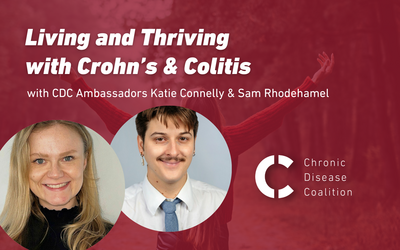
Approximately 3 million Americans live with Crohn’s disease and ulcerative colitis, collectively known as inflammatory bowel disease (IBD). These lifelong conditions bring unique challenges, but better treatment, awareness and support are helping people manage their conditions and keep their lives on track.
While IBD is becoming more understood, many people still hesitate to talk to their doctors about digestive issues, leading to delayed diagnoses. To break this stigma, IBD patients– and Coalition ambassadors– Katie and Sam are sharing their stories to help others feel more comfortable asking questions, seeking medical help, and connecting with supportive communities that offer empathy and practical advice for managing these complex conditions.
Living with Crohn’s: Katie Connelly & Sam Rhodehamel
For Katie Connelly and Sam Rhodehamel, living with Crohn’s disease has meant navigating physical challenges, emotional hurdles, and self-discovery.
Diagnosed at age 10, Katie has faced serious health problems, including surgeries to remove fistulas—small tunnels that connect parts of the body that shouldn’t be connected—and to treat perianal abscesses, which are painful infections near the anus. Humor and comradery help her stay optimistic:
"Fistulas of any kind can feel super-overwhelming and isolating due to the lack of consistency and understanding around them in the medical field. Please know this baddie (with both a bad and good ass) is with you in this fight for the right to find SOMETHING that will heal them for us."
For Sam, being newly diagnosed has been a learning journey:
"This is my first Crohn’s Awareness Week since my diagnosis," he shares. "Looking back, I’ve learned how to listen to my body in new ways. By seeing my health as a whole system, I’ve gained a better understanding of how my microbiome and immune system work together."
Building a Supportive IBD Community
Finding community has been critical for many living with IBD. Katie emphasizes its value:
"Community is everything. No matter how much my friends without IBD try to understand my life, there’s truly nothing else like finding a bestie who can relate."
They also recommend connecting with the broader IBD community online. Some of their favorite online resources include:
- @badass.w.a.bad.ass – Katie’s own Instagram account for advocacy and connection.
- @natalieannhayden – A patient leader and mom sharing her IBD journey.
- @about_IBD – Amber’s podcast and content focus on life with a J-pouch.
- @betterbelliesbymolly – Advocacy insights and helpful tips.
"Social media has a HUGE community of IBD baddies who are always willing to connect and chat, plus can point you in the direction of even more baddies," Katie adds.
At the Chronic Disease Coalition, we’re dedicated to amplifying the voices of patients like Katie and Sam and advocating for better treatments and understanding. This Awareness Week, let’s stand together to support the IBD community and drive change for those impacted.